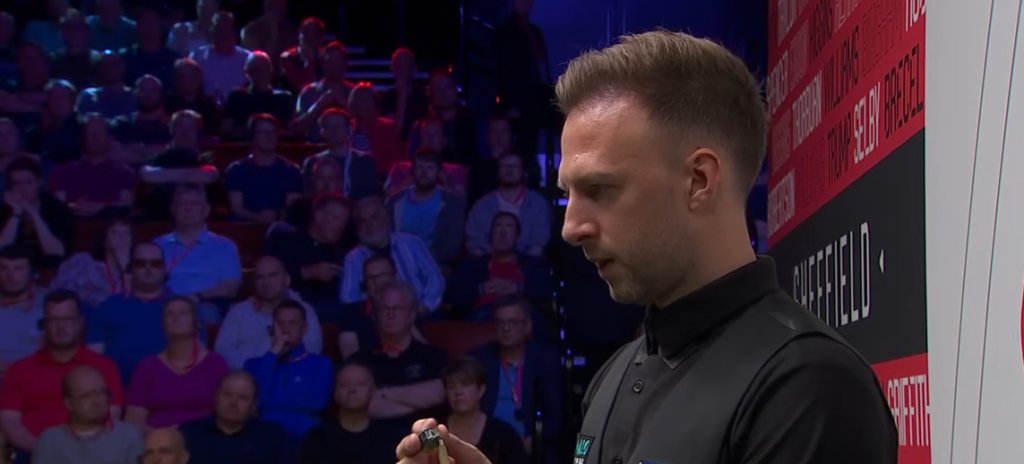Although Judd Trump is well-known throughout the world for his skill at snooker, his less obvious but highly calculated personal decisions are subtly creating a new legacy. The former world champion has changed more than just his postal code since moving to Hong Kong. He has reshaped his rhythm on a personal and professional level by forming a relationship with figure skater and TV personality Maisy Ma.
Maisy, who has won seven Hong Kong skating titles, is an extremely talented individual in her own right. She left a life of knives and podiums to pursue a polished career in media. She exudes a polished confidence while fronting Mercedes-Benz campaigns, co-hosting horse racing broadcasts, and presenting during the Olympics in Paris. Trump has benefited greatly from her grasp of performance pressure and her unflinching public poise, especially in recent seasons when his form has been defined by consistency.
Instead of being based on mutual promotion, their partnership is based on understanding. Their relationship isn’t fueled by photo ops or carefully timed social media posts, in contrast to most celebrity couples. It breathes silently behind closed doors instead. Their refusal to publicly display their romance feels almost revolutionary; it is strikingly similar to the restraint displayed by couples who have long embraced minimal exposure in favor of maximum stability, such as Federer and Mirka or Daniel Craig and Rachel Weisz.
Judd Trump & Maisy Ma – Personal & Career Details
| Attribute | Details |
|---|---|
| Full Name | Judd Trump |
| Date of Birth | August 20, 1989 |
| Birthplace | Bristol, England |
| Residence | Splits time between Hong Kong and Dubai |
| Profession | Professional Snooker Player |
| Current Partner | Maisy Ma (Hong Kong Skater & Television Host) |
| Major Career Titles | 30 Ranking Titles, 5 Triple Crown Titles |
| World Championship | 2019 Winner |
| Net Worth Estimate | £10–15 Million |
| Career Status | Active – 2025 World Championship Semifinalist |
| Official Reference | Wales Online |
The impact of this relationship goes beyond sentiment, which makes it especially novel. Trump acknowledged that Maisy’s upbringing aids in bridging the emotional divide that frequently separates professional athletes. In a recent interview, he clarified, “She still works in TV, so she knows what I go through.” His previous, short-lived relationships are very different from this emotional fluency, which is combined with a common language of discipline and public scrutiny.

He was briefly associated with Khadijah Misr, an equestrian from the United Arab Emirates, who joined him in celebrating his Player’s Championship victory back in 2017. Although that relationship ended quickly, Ma’s presence seems to be much more consistent. She has subtly altered his mental terrain. Trump’s game has significantly improved, according to observers, becoming calmer under pressure, smoother in execution, and clearer in strategy.
It appears that a relationship based on depth rather than show is the source of that stability. Trump has risen above the stereotype of a “part-time playboy,” which was carelessly perpetuated by his early Twitter bio. Years later, Barry Hearn’s criticism that playboys had no place in snooker is no longer valid. Trump’s development today has silenced those comments—not with arguments, but with outcomes.
His choice to completely leave the UK and establish a base in Hong Kong while spending more time in Dubai is indicative of broader changes in the sports industry. By moving, athletes like Novak Djokovic and Lewis Hamilton have long improved their lifestyle, taxation, and access to international markets. Trump’s action reflects that tendency, showing how modern athletes, particularly those with international fan bases, aren’t hesitant to cross national boundaries in order to maximize their personal and financial gain.
Hong Kong provides more than just beautiful skylines in this regard. It provides a platform that reflects Maisy Ma’s indigenous influence, media privacy, and neutrality. Trump can enter new arenas as a player and as a public figure who is willing to reinvent herself thanks to her reputation and heritage, which serve as a cultural bridge.
Trump’s semifinal performance against Mark Williams at the 2025 World Championships received a lot of praise for its steadiness, which supported each shot, as well as its tactical skill. Analysts are starting to make the connections: his professional comeback is being fueled by his personal life, which is now remarkably grounded.
The way that Trump and Ma intentionally exercise restraint in managing this evolution is what makes it even more compelling. They don’t use one another to amplify images. They are not connected in order to promote products or generate hashtags. Its functions include stabilizing, refocusing, and quietly thriving.
Their story comes at an intriguing time for society. Trump and Ma take a very different tack from other celebrity couples who are increasingly embracing curated transparency through choreographed TikToks and red carpet reveals. They lean out rather than in. The timeless idea that sometimes silence is the loudest form of confidence is highlighted by their love story, which is bolstered by a shared ambition and shielded from excessive publicity.
Additionally, their relationship offers a particularly relevant case study for younger athletes navigating the pros and cons of fame. It demonstrates that relationships based on respect for one another rather than reciprocal promotion can result in more than just publicity.


